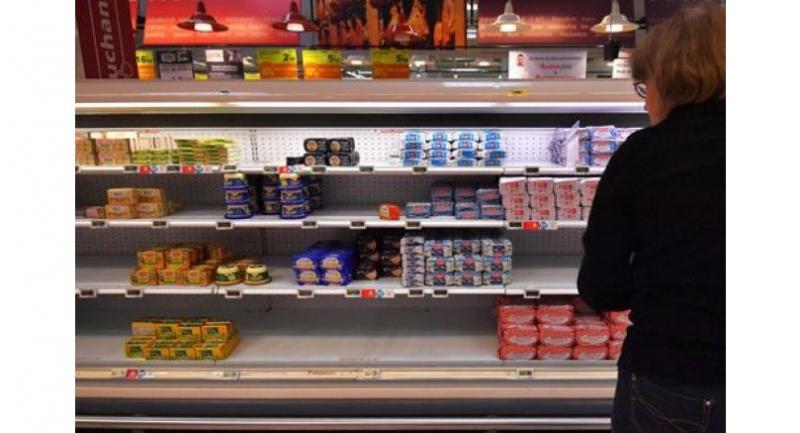Life without the creamy comforts

A butter shortage chills France’s patisserie-loving soul
There can arguably be no greater threat to the French way of life than a lack of butter.
For months France has been gripped by a slow burning panic that it is running out of the golden ambrosia, which is the base of croissants and pains au chocolat as well as the whole mouth-watering panoply of French patisseries.
Supermarket shelves have been emptied of butter as shoppers worry they will have nothing to put on their breakfast tartines of toasted baguette, while worried bakers fear a “croissant crisis” as prices spiral.
“We always loved butter, but we never knew how much,” sociologist Remy Lucas, says who specialises in people’s relationship with food.
“Now we realise how important it is in our daily lives. Obviously we can replace it nutritionally but the idea that we might be without it is really unbearable,” he adds.
French people eat more butter per capita than anyone else in the world – three times more than Americans – yet still have among the lowest obesity levels of developed countries.

Faced with mounting anxiety about having to go without butter, churn makers say that enquiries from city dwellers who clearly have no access to dairy cows has soared, while a spate of YouTube videos showing people how to make butter have been viewed tens of thousands of times within days of going online.
“It’s been a long time since I did a video which took off so quickly,” says popular recipe blogger Herve Palmieri.
“The last one that went viral with a few million views was ironically about how to make a chocolate cake without butter or sugar,” he adds.
Google says internet searches on how to make butter rocketed 925 per cent between September and October.
Wholesale prices for butter more than tripled over the past year driven by rising demand in Asia, with Chinese consumers in particular reportedly developing a weakness for flaky, butter-rich croissants.
With many French supermarkets refusing to pay higher prices because they tend to fix them annually, butter has gone abroad.
The drop in supplies has been accentuated by panic buying, with the safety net of the EU’s once enormous butter mountain no longer there, having melted away to a mere one percent of its size last year.
Parisian baker Dominique Eury says he has never encountered such a shortage in the 44 years he has been manning his oven in the 17th district of the capital.
“Ten days ago I could not get the butter or cream that I needed. Until now we have got by, what is really worrying me is the holidays. The world has gone mad,” he says.
Eury said he gets through twice as much butter during Christmas as he makes the traditional “buche” chocolate log dessert and the marzipan “galette of the kings” the French eat in January.
With his suppliers only able to get their hands on 80 per cent of the butter they want, Eury says he’s putting stocks aside just in case of a crisis over the Christmas period.
The idea that they could make do with margarine is not something French bakers are prepared to contemplate.
“We make everything with butter,” says Arnaud Delmontel, who has four bakeries in the capital.
Although he believes the shortage is not real, he complained that the rise in prices has become “unreasonable”, and some of the butter he has received had clearly been frozen.
“People are speculating and making a lot of money,” he claims.
Global demand for butter is outstripping supply, according to the US Department of Agriculture, as consumers turn away from vegetable-oil based products in search of something “safer”.
Butter’s image as a cholesterol-choked dietary bad guy has changed radically in recent years. Many scientists now say it is “neutral” health-wise – news that Time magazine celebrated with a 2014 cover proclaiming, “Eat butter”.
All of which further reinforces the French emotional attachment to its creamy comforts, Lucas argued.
Grandmothers in the buttery heartlands of Brittany and Normandy still use it as a cureall for bumps and bruises and Lucas said this “brings us back to our childhood... to the intimate comforts and joy of butter at breakfast and in afternoon snacks. Naturally butter is something that makes us happy.”
“Until the shortage,” he says, “butter was just something in our fridges. We had taken it for granted because we always had it, except during World War II.”
Having to worry about getting enough was “shocking and paradoxical” to French people, the sociologist insists.
“In the ‘Land of Butter’ we find it extremely difficult to imagine that we can live without it.”





